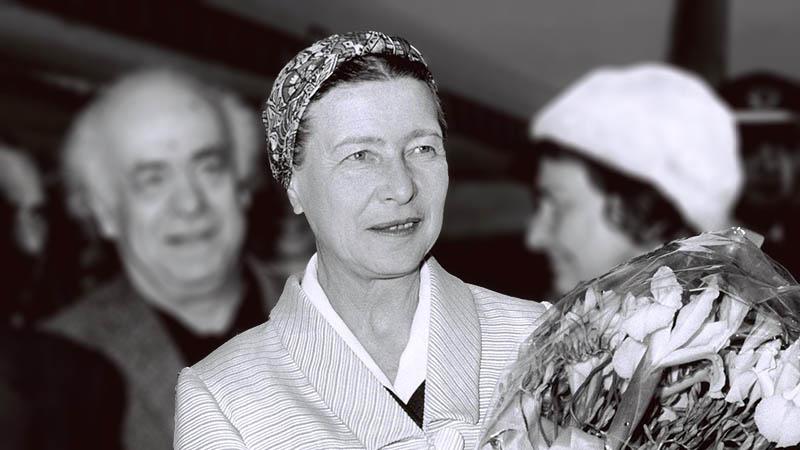Simone de Beauvoir
Episode #3 of the course Great modern philosophers by Tom Butler-Bowdon
In a nutshell: The concept of “Other” helps us understand the position and power of women through history.
At 40, Simone de Beauvoir was the author of several well-received novels but was better known as Jean Paul-Sartre’s long-time companion. All that changed with the release of The Second Sex (1949). The book was a bestseller from the start, and de Beauvoir found herself the most controversial woman in France.
Given her relatively privileged position—teaching career, university degree, movement in Parisian intellectual circles—de Beauvoir herself had never felt much of a sense of injustice or inequality. But she began to realize that people saw her as Sartre’s inferior just because she was female. When she sat down to write The Second Sex, she was surprised to find herself putting down the most essential fact: “I am a woman.”
The book is not simply about the role of women in history or society, but “Woman” as an archetype and philosophical category that is interchangeable with the idea of “Other.” This philosophical base raises it above other feminist writing and makes it fascinating reading.
Woman as Other
The Second Sex is an attempt to answer the basic question, “What is Woman?”—that is, as an archetype or category as opposed to women as individuals. Throughout history, men have differentiated and defined women in reference to themselves, rather than as beings in their own right. A person is a man, and no more explanation is necessary, while a woman must be described as a person of the female sex. The result, de Beauvoir says, is that woman is “the incidental, the inessential as opposed to the essential. He is the subject, he is Absolute—she is the Other.”
What is “Other,” she notes, can be applied to any group in society that is not considered the “main” group. In Western civilization, for instance, white men are the “essential,” the “Absolute,” while any other kind of person, including women, Blacks, and Jews, have been—whether consciously or unconsciously—put in the Other basket. And when a group in society is made inferior in this way, they become inferior through lost opportunities and debasement.
In many physical respects, a woman is less rugged than a man, and so ostensibly, her projects and prospects are more limited, but drawing on Heidegger, Sartre, and Merleau-Ponty, de Beauvoir notes, “the body is not a thing, it is a situation.” Seeing it this way, women’s prospects may be different to men’s, but no more limited. What’s more, many of women’s “weaknesses” are so only in the context of male ends. Physical inferiority, for instance, becomes meaningless if there is an absence of violence and wars. If society is different, so the evaluation of physical attributes changes.
Becoming Woman
Book Two contains de Beauvoir’s famous comment that “…one is not born but rather becomes a woman.” In childhood, there is no difference between the sexes in terms of what they are capable of. Differentiation begins when boys are told of their superiority and how they need to prepare for the difficult, heroic path ahead. While pride in his sex is pointed out to a boy by adults, the girl’s sexual anatomy does not receive the same reverence.
When sexual awakenings occur, boys are aggressive and grasping, whereas for the girl, it is often a case of fraught “waiting” (“She is waiting Man.”) Since time immemorial, Woman has looked to the male for fulfilment and escape. So, girls learn that to please, they must abdicate their power and independence.
Woman’s character, de Beauvoir concludes, is molded by her situation. Women are not socially independent but form a part of the groups governed and defined by men. Any club or social service they set up are all within the framework of the masculine universe. “Many of the faults for which women are reproached—mediocrity, laziness, frivolity, servility,” she points out, “simply express the fact that their horizon is closed.”
Final Word
If you are female, reading The Second Sex will remind you of the progress made for women in the last 60 years. If you are male, it will help you understand the slightly different universe that women inhabit, even today.
Tomorrow…Michel Foucault and the cultural basis of knowledge.
Recommended book
The Second Sex by Simone de Beauvoir
Share with friends

